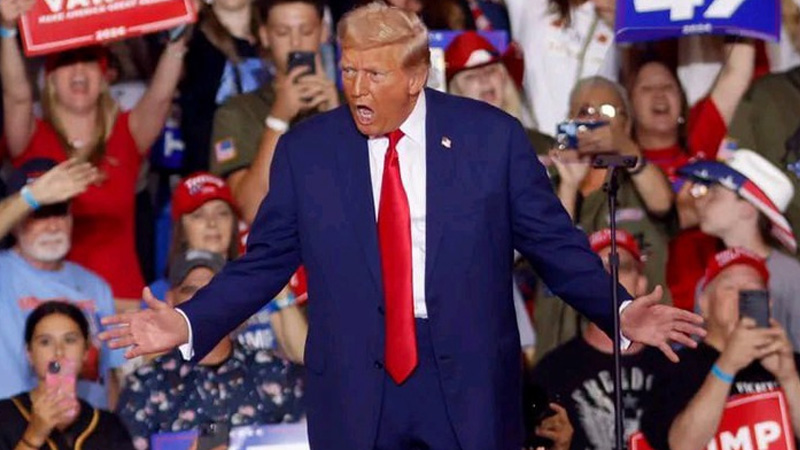Trump’s Election Interference Cover-Up Crumbles As New Evidence Reveals Startling Secrets

Photo Credit : Steven Hirsch/Pool
As the investigation into former President Donald Trump’s efforts to overturn the 2020 election results intensifies, the facade of his alleged cover-up appears to be crumbling. New evidence has surfaced, revealing startling secrets that could significantly impact Trump’s legal standing and political future. This latest development sheds light on Trump’s attempts to interfere with the electoral process and underscores the gravity of the situation as the nation approaches the 2024 presidential election.
Led by Special Counsel Jack Smith, the investigation has faced numerous challenges, including legal setbacks and delays. However, recent revelations suggest that Smith may still have avenues to pursue in his quest for justice. Legal expert Elie Honig, in a detailed analysis on CAFE.com, highlighted the potential impact of this new evidence on the case, especially in light of a recent Supreme Court ruling that granted former presidents some protection from prosecution for actions taken while in office.
According to a report by Newsweek on Sunday, August 25, 2024, the Supreme Court’s ruling, handed down in July, complicates Smith’s efforts to hold Trump accountable for his alleged attempts to alter the outcome of the 2020 election. Key elements of the case, such as Trump’s alleged pressure on then-Vice President Mike Pence and efforts to manipulate the Department of Justice, may now face significant legal hurdles. Despite these challenges, Honig believes that Smith could still make a compelling case by seeking an evidentiary hearing.
An evidentiary hearing would allow Smith to present witness testimony and other evidence to a judge to determine its admissibility in court. Although not a full trial, such a hearing could nonetheless bring to light critical information about Trump’s actions in the lead-up to January 6, 2021. Honig speculates that this could include testimony from key figures like Trump’s former Chief of Staff Mark Meadows and Mike Pence himself.
“We could see Trump’s former chief of staff, Mark Meadows, take the stand to give his first-ever public accounting of what his boss did (and didn’t do) before and on January 6,” Honig writes. “And Mike Pence could testify about how Trump begged and eventually threatened him in an effort to get him to throw the election—and how, on January 6, he had to run for his life to avoid the frothing mob.”
The prospect of such testimony, especially during an election year, could have profound implications. While an evidentiary hearing lacks the finality of a trial, the public airing of these allegations could significantly influence the political landscape. As Honig points out, the spectacle of Trump’s closest allies recounting the events of January 6 under oath could be damaging to his campaign efforts in 2024.
“But, really, imagine: Trump’s own former chief of staff and VP taking the stand in, say, September of an election year, to describe firsthand how their former boss trampled on the Constitution to try to steal an election,” Honig observes. “Even if we all mostly know the story by now, that simply can’t be good for Trump at the polls, just weeks before voters cast their ballots.”
Smith’s strategy appears focused on ensuring that the American public is fully aware of the seriousness of Trump’s actions before they head to the polls. Honig argues that exposing Trump’s conduct, even in a partial or preliminary fashion, could be enough to sway public opinion. “But if Smith’s goal is to expose Trump’s conduct to the American public before the election—and let’s face it, that’s plainly been a driving force for the special counsel all along, despite his refusal to acknowledge it—he’ll still have a backdoor path to partial success,” Honig notes.
Trump, for his part, has consistently denied any wrongdoing. He maintains that his actions were within the scope of his duties as president and that the charges against him are politically motivated. His legal team has sought to have the charges dismissed, arguing that they stem from actions Trump took in his official capacity as president. However, the Supreme Court’s ruling suggests that the protections afforded to former presidents are not absolute and that the nature of Trump’s actions will be scrutinized to determine whether they fall within the bounds of his presidential duties.
The legal and political ramifications of this case are far-reaching. Should Trump be convicted, it would mark the first time in U.S. history that a former president has been held criminally responsible for actions taken while in office. Moreover, the outcome of this case could have significant implications for Trump’s potential return to the presidency in 2024. If he were to win the election, he would become the first president ever to assume office with a criminal conviction hanging over his head.
As of now, Trump remains a leading figure in the Republican Party, though his legal troubles have undoubtedly cast a shadow over his campaign. Recent polling data from FiveThirtyEight shows him trailing slightly behind Vice President Kamala Harris, with Harris at 46.3% and Trump at 43.7%. The close nature of the race underscores the potential impact that ongoing legal developments could have on voter sentiment.
The unfolding case against Trump is not only a legal battle but also a test of the nation’s democratic institutions. It raises fundamental questions about the limits of presidential power and the accountability of those who hold the highest office in the land. As new evidence continues to emerge, the country watches closely, aware that the outcome of this case could reshape the political landscape and set new precedents for the conduct of future presidents.
Regardless of the final verdict, the investigation into Trump’s alleged election interference will be remembered as a pivotal moment in American history. It challenges the nation’s legal and political systems in unprecedented ways and forces a reckoning with the principles that underpin the republic. As the 2024 election looms, the revelations from this case will undoubtedly play a crucial role in shaping the future of American democracy.





